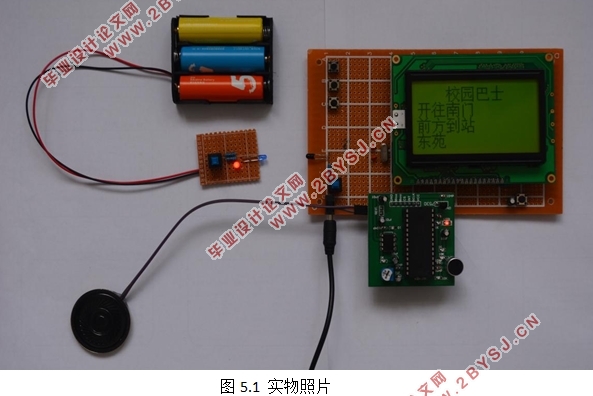基于单片机的公交车自动报站器设计
无需注册登录,支付后按照提示操作即可获取该资料.
基于单片机的公交车自动报站器设计(任务书,开题报告,论文12000字)
摘要
近年来,随着经济与科技的发展,公共交通系统日趋成熟,其中公交车报站系统是公交服务的重要环节,它性能的优化和性价比的提升具有重要的意义。而且不容忽视的是在这样的环境中,部分地方还在使用落后的人工口头报站,其准确度不高,性价比较低。
本设计是基于微机技术的公交自动报站系统,可以实现公交车的语音自动报站[1]。选用STC89C52RC单片机作为主控芯片完成主控电路,利用红外模块实现无线信号的收发,再通过ISD4004语音模块实现语音播报提示,同时用LCD12864进行文字显示。本设计选择模块化的方法,从硬件选择到软件程序编写,设定清晰地步骤,按时完成相应的任务。
关键词:公交车自动报站 STC89C52单片机 ISD4004语音芯片 LCD显示屏
Design of bus stop reporting device based on MCU
Abstract
In recent years,With the development of economy and science and technology, the public transport system is becoming more and more mature,Among them, the bus stop station as an important part of bus service, its performance optimization and cost performance promotion is of great significance.And what can not be ignored is that in such a big environment,Some places still use backward artificial oral reporting station, the accuracy is not high, and the economic value is low.
This design is the automatic bus stop reporting system based on microcomputer technology, which can realize the bus voice automatic reporting station. Using STC89C52RC MCU as the main chip to complete the main control circuit, wireless signal transceiver using the infrared module, and then through the ISD4004 module to realize voice broadcast voice prompt, and use LCD12864 to display text. The design selects modular methods, from hardware selection to software programming, setting clear steps and completing the corresponding tasks on time.
Key Words:Automatic bus station reporting;STC89C52 MCU;ISD4004 voice chip;LCD display

目录
摘要 III
Abstract II
目录 III
第一章 绪论 1
1.1研究背景及发展现状 1
1.1.1研究背景 1
1.1.2发展现状 1
1.1.3 单片机与语音芯片发展现状 2
1.2研究目的及意义 3
第二章 系统总体设计 4
2.1设计思路与系统框架 4
2.2控制功能实现要求 4
2.3方案论证与确认 5
2.3.1 控制器的选取 5
2.3.2 语音芯片的选择 5
2.3.3 收发模块的选取 6
2.3.4显示屏的选取 6
2.4本章小结 7
第三章 系统硬件设计 8
3.1 硬件设计概述 8
3.2关键单元电路的设计 8
3.2.1 STC89C52RC单片机模块 8
3.2.2 ISD4004语音模块 10
3.2.3 LCD12864显示屏 12
3.2.4 红外收发模块 14
3.2.5系统电路图 15
3.3 proteus软件介绍 17
3.3 本章小结 17
第四章 系统软件设计 18
4.1软件流程设计 18
4.2 各模块程序设计 19
4.2.1语音程序 19
4.2.2 LCD12864显示子程序 23
4.2.3 按键子程序 27
4.2.4 系统主程序 33
第五章 软硬件调试与实现 35
5.1 Keil软件介绍 35
5.2 软件调试 35
5.3 实物展示 35
5.4 本章小结 36
致谢 37
参考文献 38
